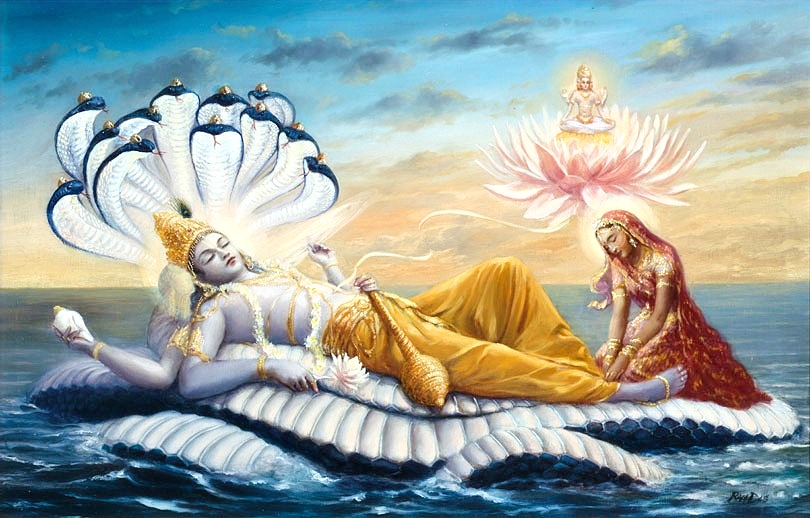
Putrada Ekadashi
Dec - Jan
Yudhisthira Maharaj said, “Oh Lord, please explain the details of the Ekadashi that occurs in the light fortnight (Shukla or Gaura paksha) of this month. What is its name, and what Deity is to be worshipped on that sacred day?”
Sri Krishna replied,
“For the benefit of all humanity, I shall tell you how to observe fasting on the Pausha-shukla Ekadashi. As in every Ekadashi one should observe the rules and regulations of the Ekadashi vrata. Putrada Ekadashi destroys all sins and elevates one to the spiritual abode. Shri Narayana, is the worshipable Deity of this Ekadashi.
I shall tell you the history of Putrada Ekadashi, which removes all kinds of sins and makes one famous and learned.
There was a kingdom named Bhadravati, ruled by king Suketuman. His queen was Shaibya. As he had no son, he spent all his time anxiously thinking, ‘What should I do? How can I get a pious son (putra)?’ Both the king and queen were in great distress. Even when they offered tarpana to their forefathers, they thought that they would have no descendants to offer tarpana to them when they died. They were upset to learn that their forefathers too were worried that soon there would be no one to offer them tarpana.
The king thought that without a son, marriage is wasted. Bereft of a son, a man cannot liquidate the debts that he owes his forefathers, the demigods (devas) and other human beings. A son is proof of the pious activities a man performed in his past one hundred lifetimes, and such a person achieves a long life in this world, with good health and wealth. Having sons and grandsons in this lifetime proves that one has worshipped Lord Vishnu in the past. The great blessing of sons, wealth, and sharp intelligence can be achieved only by worshipping the Supreme Lord, Sri Krishna.
Noticing that he was gradually destroying himself by his anxiety over the lack of a son, the king mounted his horse and left for the dense forest alone. King Suketuman wandered aimlessly in the forest. Soon it was midday, and he was tormented by hunger and thirst. He thought, ‘What sinful deed could I possibly have done so that I am now forced to suffer like this? I have pleased the devas with abundant worship.’
Absorbed in these thoughts, due to his pious credits, he came upon a beautiful lotus bearing pond that resembled the famous Lake Manasarovar. Nearby were many ashramas, where resided many saints and sages who could fulfill the desires of anyone. The king dismounted his horse and addressed them with glorified praises. Observing the respect the king offered them, the sages said, ‘Kindly tell us why you have come here. What is on your mind?’
The king replied, ‘Oh great sages, what are your names, surely your presence reveals that you are auspicious saints? Please tell me everything.’
The sages replied, ‘We are known as the ten Vishvadevas (the sons of Vishva; Vasu, Satya, Kratu, Daksha, Kala, Kama, Dhriti, Pururava, Madrava, and Kuru). We have come here to this lovely pond to bathe. The month of Magha (Madhava masa) will soon be here in five days (from the Magha nakshatra), and today is the famous Putrada Ekadashi. One who desires a son should strictly observe this particular Ekadashi.’
The king said, ‘I have tried so hard to have a son. If you great sages are pleased with me, kindly grant the boon of having a good son (putra).’
‘The very meaning of Putrada,’ the sages replied, ‘is “giver of a putra, pious son.” So please observe a complete fast on this Ekadashi day. If you do so, then by our blessing – and by the mercy of Lord Sri Keshava invested in us – surely you will obtain a son.’
On the advice of the Vishvadevas, the king observed the auspicious fast day of Putrada Ekadashi according to rules and regulations, and on the Dvadashi, after breaking his fast, he paid obeisances to all of them.
After Suketuman returned to his palace he united with his queen. Queen Shaibya immediately became pregnant, and exactly as the Vishvadevas had predicted, a son was born to them.
In conclusion,
Oh Yudhisthira, one who wishes to fulfill his desires should strictly observe Putrada Ekadashi. While on this planet, one who strictly observes this Ekadashi will surely obtain a son, and after death, he will achieve liberation. Anyone who even reads or hears the glories of Putrada Ekadashi obtains the merit earned by performing a horse sacrifice. It is to benefit all humanity that I have explained all this to you.”
Thus ends the narration of the glories of Pausha-Shukla Ekadashi, or Putrada Ekadashi, from the Bhavishya Purana of Veda Vyasadeva.